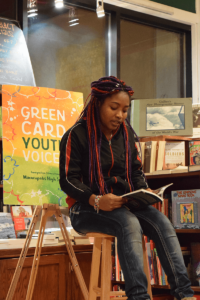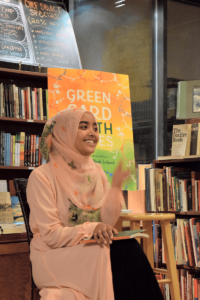Ikrem Nuru hasn’t seen her mom for four years, since she came to the United States from Ethiopia to live with a father she barely knew. Nanah Jalloh was 12 when she left her father in Sierra Leone to live with her mother, who had come to the United States when Nanah was a year old.
Different details, common threads as the two young women told of separation from family and adjustment to life in Minnesota, during a program at Eat My Words Bookstore a few weeks ago. Their stories are featured in Green Card Youth Voices, a book of transcripts from a video project documenting the experiences of immigrant teens. The
December 1 event at the bookstore was billed as a reading but evolved into a discussion, thanks to eager questions posed by both the audience and the presenters.
For both Jalloh’s and Nuru’s families, immigrating to the United States was driven by the promise of a better life. Nuru gave the audience a sense of her family’s economic realities: She said she and her sister wanted to go to school, but they could only afford one uniform, so she would go to school in the morning, then dash home to give the uniform to her sister, who would attend in the afternoon.
Her father had left their home in Asasa, Ethiopia, to work in Kenya when she was 2 years old and eventually came to the United States. The money that he sent to Nuru’s mother allowed them to move out of a house where they were living with six other families.
Jalloh spoke of growing up in Freetown, Sierra Leone, and of being raised by her dad. A nurse who owned a pharmacy (which he was able to open with money her mother had sent from the States), he ironed her school uniform and helped her do her homework. Jalloh talked about the war in Sierra Leone – not something that she had firsthand knowledge of, but that she learned about from her mother, who had to run from the war when pregnant with her.
Both girls spoke about how hard it was to leave the only parent they had come to know. Nuru said that she was hurt and confused when her mother seemed to want her to leave Asasa. “She just wants to make my heart strong,” she said she eventually realized.
Jalloh talked about her firsts in Minnesota: first day in school, first time standing in snow waiting for the school bus, first time at Valleyfair, where the rides scared her. (“I was kind of crying, but it was fun.”) Now a senior at Wellstone International High School in Minneapolis, she has served on the Student Council and participated in track, something she also did in Sierra Leone. Jalloh also spoke of challenging times – about having to live with her aunt because of difficulties with her mother, and about a girl who always wanted to fight her in school.
Nuru, a Wellstone graduate who is in her first year at Minneapolis Community and Technical College, said that she has been happy living in Minnesota, but not everything has gone well. “I have faced discrimination. Sometimes this America is not fair,” she said. A couple months ago she said that on her way to work a man threw alcohol at her and told her “Take off this shit,” referring to her hijab.
“No one ran up to me asking me if I was okay. The words the guy say, they didn’t hurt me at all. What hurt me was the people who were just passing me not seeing me as a human being, just because I’m Muslim or I’m black. It really hurt,” she said.
The teens responded to questions from the audience, as did Veronica Quillien, a Green Card Voices board member and a first-generation immigrant who introduced Jalloh and Nuru.
A couple people asked about the recent election, and how they were affected by it. “I was never satisfied with the election, but at the same time I was normal,” Nuru said. “My mom, she used to tell me, “Don’t expect to have positive people around you all the time … you can have negative people, and don’t hate them, because they are your enemy and they will make you strong.”
She said that she is afraid of what Trump supporters might say or do to her, but that the situation is encouraging more communication between more people. “I think we are coming together, showing to be one community. If we don’t know each other he [Trump] is making us to get to know each other more. We are working together. We are finding a way that we can fight back,” Nuru said.
Quillien talked about the election being “a tipping point” that has led to conversations like the one that evening. “It helps us learn to figure out ways to deal with our fears, by really making ourselves uncomfortable and starting to ask those questions that I know a lot of you are dying to ask, and by just really putting ourselves out there and being vulnerable,” she said.
“For me as a black person living in the U.S., nothing has really changed, it’s just that now people are more conscious of their own bias, whatever bias that is,” Quillien said.
Toward the end of the evening, Nuru turned the Q & A around, asking the dozen-plus listeners: “Why did you come to hear our stories?” and “What do you think of when you hear the word immigrant?”
To the first question, Eat My Words owner Scott VanKoughnett said that he was eager to host the reading as he has always been interested in hearing immigrant stories, starting with his grandmother’s stories of coming to this country.
“Just the whole idea of what it takes to change your life completely, to go into a different society and a different culture and to try to get by, what courage that takes … all the people who are against immigrants for whatever reason, don’t seem to understand that,” he said.
One woman said that she thinks of the words “courage” and “trust” when she thinks of immigrants. “Thinking about your parents, and just having them leave safety and security for this idea of a better life that’s not guaranteed,” she said. “You had family, friends, culture that you’re so familiar with and to leave that takes a lot of courage.” The woman also talked about the trust the girls needed to place in their parents in order to accept their decision to send them to this country.
The final question of the evening was directed at the two young immigrants. “Why do you want to tell people your stories?” Nuru said that she wanted to encourage others who face difficulties. “I just want to tell the story and make them feel like this is what happened to me, but still I’m strong, I can stand for myself, I can go to college, make my dream come true, so not to give up.”
“I think it’s important for people to hear our voices, to know where we are as human beings, so they can understand us,” Jalloh said.
To watch videos of almost 200 immigrants of all ages telling their stories, and to learn more about Green Card Voices projects, go to greencardvoices.com
Below: Nanah Jalloh reading, left. Ikrem Nuru, conversing with an attentive and curious audience. (Photos by Karen Kraco)

